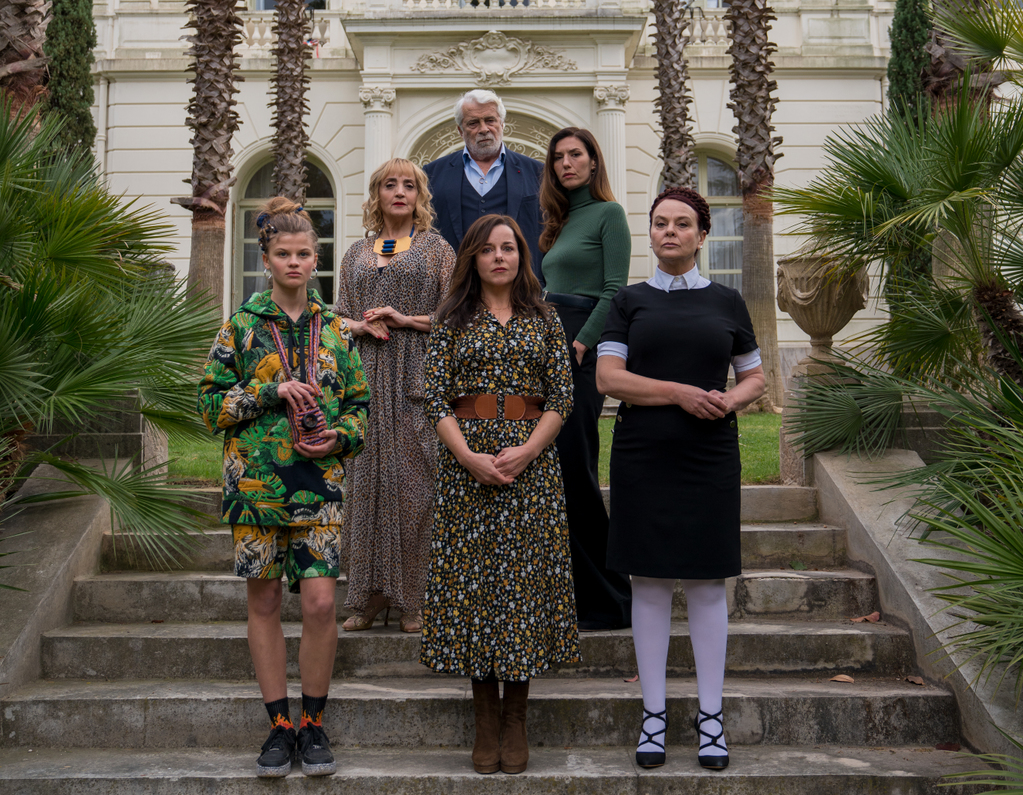“When the French get their Knives Out, things get haute.” Or so argue the directors of Filmfest DC, the District-wide international film festival that ran from April 19 to 30.
The twelve-day annual event featured 65 films from 30 countries, all curated with one goal in mind: to foster connection across audiences by demonstrating their common humanity. Although these films are undeniably grounded in the local communities they sprang from, the stories they tell—about family, betrayal, loss, and more—are truly global. It’s no surprise, then, that even in such distinguished company, French filmmaker Sébastien Marnier’s The Origin of Evil (2022) would be a fan favorite.
The mystery-thriller follows Stéphane (Call My Agent’s Laure Calamy), a kindly fish cannery worker who decides to build a relationship with her estranged billionaire father (Jacques Weber)—much to the displeasure of her newfound stepfamily. Thrust into a world of overwhelming wealth and pretension, Stéphane must dodge the ire of her compulsive-shopping stepmother (Dominique Blanc) and combative stepsister (Doria Tillier), both hell-bent on inheriting her father’s massive estate.
The film is exquisite in its excess. Production designer Damien Rondeau scatters a seemingly infinite number of knick-knacks throughout the family mansion, ranging from mountains of throw pillows to towers of cassette tapes, managing to make the luxurious palace feel claustrophobic. The ubiquitous presence of taxidermied wolves, cats, and foxes create the unnerving feeling that somebody is always watching. The nimiety of the space is overwhelming, generating revulsion from the obscene wealth and mirroring the family’s own dysfunction as they desperately jockey for power.
This effect is further achieved through the film’s extravagant camerawork. Agonizingly slow pans ratchet up the tension, and sophisticated filming techniques—like a crane shot over a simple couch conversation—infuse every scene with glamor and mystique. Family discussions are shot using split-screens, spurring audience members to hungrily vacillate between characters, never sure which character, comment, or facial expression to focus on.
Cinematographer Romain Carcanade seems especially interested in emphasizing the film’s stark class tensions. Magnificent landscape views flanked by well-trimmed hedges are juxtaposed with dreary factory hallways, playing into the vast contrast between Stéphane’s daily life and this world of unbelievable affluence. Stéphane’s first look at her father’s opulent villa is shot through her eyes, a shaky camera in the backseat only allowed a few fleeting glimpses of the property. The audience is encouraged to experience this new environment in the same foreign and terrifying light that Stepháne does. We are happy to oblige.
In addition to the film’s simpler pleasures, like its visceral murder scenes and near all-woman cast, The Origin of Evil is often hilarious. Fully aware of its own maximalism, the film takes a mischievous delight in intensifying its absurdity without warning. One particularly successful tactic contrasts an especially wild moment—like a gruesome bludgeoning—with one that’s innocuous or downright sweet—like a snoozing dog or a family sing-a-long. Some might find its humor somewhat disjointed, and understandably so; in this film, droll discussions accompany frivolous catwalks down factory corridors. But this inchoate quality feels intentionally cultivated. In the midst of the disarray, it somehow succeeds in emphasizing both the film’s extravagance and its sincerity.
The film’s performances are similarly paradoxical. Every role fulfills a clear murder-mystery archetype; there’s the wealthy patriarch, the money-obsessed spouse, the ambitious firstborn, the conniving housemaid. But rather than detracting from these characters’ intrigue, the clichéd casting punctuates the film’s appreciation of the mystery genre, and allows its actors to bask in the sheer pleasure of personifying a Clue character.
And you’d be hard-pressed to find a better Miss Scarlett than Calamy’s Stepháne. Amicable almost to the point of annoyance—yet hiding a hazy history and possessing intimate knowledge of the prison system—Stéphane’s inscrutability presents the most compelling mystery of the film. Dominique Blanc’s Louise and Doria Tillier’s George, who assume the roles of wicked stepmother and stepsister respectively, require no enigmatic background to make them provocative. When Louise brazenly suggests, after meeting Stepháne, that some of her husband’s lovers “were more beautiful than others,” the audience isn’t looking for nuance. We just want to hate them. These characters flatly refuse to be sympathetic, offering the purest kind of schadenfreude. Their irredeemability hints at Origin’s central theme: wealth’s capacity to erode our relationships, our compassion—even our humanity itself. “Family,” laments Stéphane’s teenage niece (Céleste Brunnquell), “is a contamination.”
Marnier delights in employing mystery tropes, which often makes The Origin of Evil as ostentatious as the family it depicts. Secret passageways, dimly-lit meetings, and a jittery score flirt with parody, refusing to conform to any reasonable understanding of reality. But, while somewhat charming, these excesses fail to accentuate any of the film’s deeper themes, and feel unintentionally trivializing. Although Marnier is certainly capable of masterfully using cliché, some scenes feel overdone; how many times must the film cut to a stuffed predator before we get the message? But, even with this misstep, the film is more than an empty spectacle.
The Origin of Evil is a crystallization of the Filmfest DC ethos; despite emerging from a culture an ocean away from our own, it speaks to a universal disdain for the unappreciative ultra-rich. When, upon being discovered stealing pearls from her mistress, Agnés (Véronique Ruggia) whispers, “So what? she doesn’t know what she has,” the entire audience let out a heavy sigh. The harsh reality of wealth inequality, especially in the District, where thousands experience homelessness and 15% of our population lives in poverty, goes far beyond the theater walls.
The beauty of the film, and of Filmfest DC writ large, lies in its capacity to create kinship within hardship. Each feature is a testament to humanity’s capacity for resilience, love, and joy. Works like Mamacruz (2023) remember the importance of families, both given and chosen, and films like Lakota Nation vs. United States (2023) remind us that even at our darkest moments, justice can prevail. Marnier’s Origin proves itself worthy of being presented beside such tours de force. It warns against rejecting the bonds that connect us, hinting that, like Stepháne, we all need a family.




